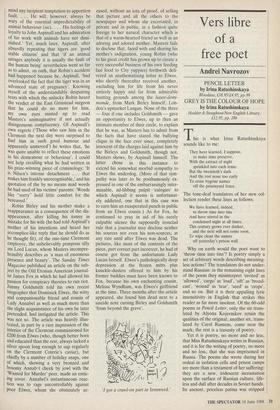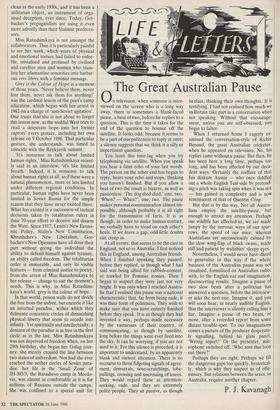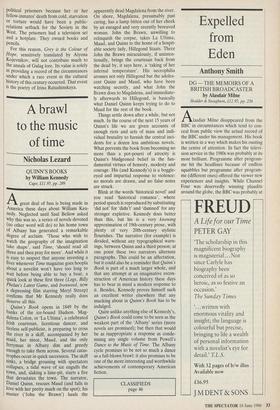Vers libre of a free poet
Andrei Navrozov
PENCIL LETTER by Irina Ratushinskaya
Bloodaxe, £10.95/14.95, pp.89
GREY IS THE COLOUR OF HOPE by Irina Ratushinskaya
Hodder & Stoughton/New English Library, £12.95, pp. 286
This is what Irina Ratushinskaya sounds like to me:
They have learned, I suppose, to make time preserve, With the extract of night sprinkled into each tense. But the twentieth's dark And the rest none too early To erase bygone names off the prisonyard fence.
The tone-deaf translators of her new col- lection render these lines as follows:
We have learned, indeed, to throw time into tins And have stirred in the condensed night at all times.
This century grows ever darker, and the next will not come soon,
To wipe clean the names off yesterday's prison wall.
Why on earth would the poet want to `throw time into tins'? Is poetry simply a set of arbitrary words describing meaning- less actions? The translators do not under- stand Russian: in the remaining eight lines of the poem they misinterpret 'invited' as `allowed', 'cargo' as 'load', 'sift' as 'broad- cast', 'wound' as 'tear', 'seed' as 'crops', and so on. But it is their appalling lyric insensitivity in English that strikes this reader as far more insolent. Of the 60-odd poems in Pencil Letter, only the six trans- lated by Alyona Kojevnikov retain the qualities of the original; another six, trans- lated by Carol Rumens, come near the mark; the rest is a travesty of poetry.
Yet it is poetry, no more and no less, that Miss Ratushinskaya writes in Russian, and it is for the writing of poetry, no more and no less, that she was imprisoned in Russia. The poems she wrote during her ordeal in isolation cells and prison camps are more than a testament of her suffering: they are a new, iridescent incrustation upon the surface of Russian culture, life- less and dull after decades in Soviet hands. Its ancient, priceless patina was stripped clean in the early 1930s, and it has been a utilitarian object, an instrument of orga- nised deception, ever since. Today, Gor- bachev's propagandists are using it even more adroitly than their Stalinist predeces- sors.
Miss Ratushinskaya is not amongst the collaborators. Thus it is particularly painful to see her work, which years of physical and emotional torture had failed to enfee- ble, trivialised and profaned by civilised and carefree men and women who trans- late her adamantine sonorities into barbar- ous vers libres with a feminist message.
Grey is the Colour of Hope is a memoir of those years. 'Never believe them, never fear them, never ask them for anything!' was the cardinal lesson of the poet's camp education, which began with her arrest in 1982 on a charge of 'anti-Soviet agitation'. One trusts that she is not about to forget this lesson now, as the wishful West tries to read a desperate hope into her former captors' every gesture, including her own release on 9 October 1986. That particular gesture, she understands, was timed to coincide with the Reykjavik summit.
`It's nonsense to talk about limited human rights,' Miss Ratushinskaya recent- ly said in an interview, 'it's like limited breath.' Indeed, it is nonsense to talk about human rights at all, as if these were a natural phenomenon, more or less limited under different regional conditions. In particular, human rights have never been limited in Soviet Russia for the simple reason that they have never existed there. What has existed is a succession of tactical decisions taken by totalitarian rulers in their 70-year effort to deceive and disarm the West. Since 1917, Lenin's New Econo- mic Policy, Stalin's New Constitution, Khrushchev's New Liberalism, Gor- bachev's New Openness have all done their part without giving the individual the ability to defend himself against tyranny, an ability called freedom. The totalitarian order is immutable, and only its visible features — from criminal justice to poetry, from the arrest of Miss Ratushinskaya to her release — change to suit the moment's needs. This is why, in Miss Ratushins- kaya's world, grey is the colour of hope.
In that world, prison walls do not divide the free from the unfree, but encircle it like an inverted paradise, within which they delineate concentric circles of diminishing physical liberty that seem to recede into infinity. Yet spiritually and intellectually, a denizen of the paradise is as free in the first circle as in the last. Miss Ratushinskaya was not deprived of freedom when, on her 29th birthday, she began her Gulag jour- ney: she merely crossed the line between two states of unfreedom. Nor had she ever reached the nether circles of Soviet para- dise: her life in the 'Small Zone' of JH-38513, the Barashevo camp in Mordo- via, was almost as comfortable as it is for millions of Russians outside the camps. She was confined to a special unit for political prisoners because her or her fellow-inmates' death from cold, starvation or torture would have been a public- relations setback for the Soviets in the West. The prisoners had a television set and a hotplate. They owned books and pencils.
For this reason, Grey is the Colour of Hope, sensitively translated by Alyona Kojevnikov, will not contribute much to the annals of Gulag lore. Its value is solely in providing a record of the circumstances under which a rare event in the cultural history of this century occurred. That event is the poetry of IrMa Ratushinskaya.




















































 Previous page
Previous page